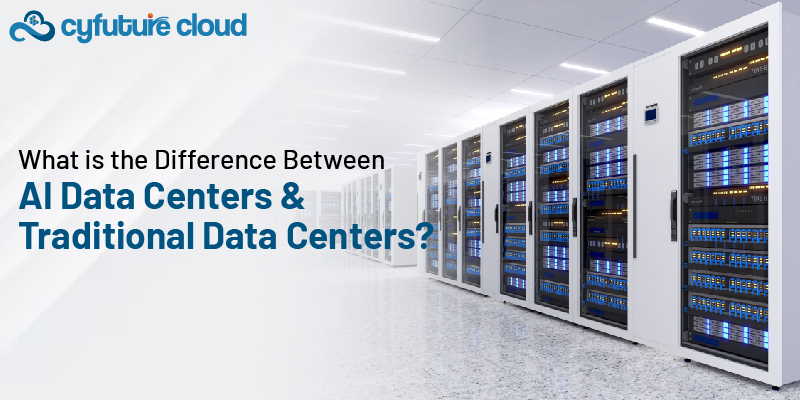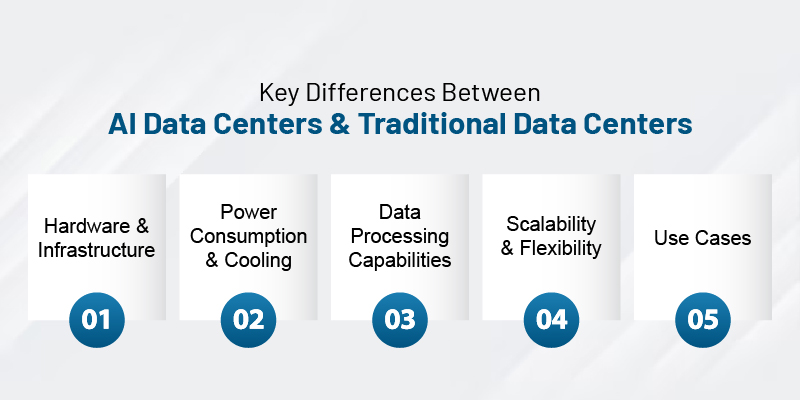 Server
Colocation
Server
Colocation
 CDN
Network
CDN
Network
 Linux Cloud
Hosting
Linux Cloud
Hosting
 VMware Public
Cloud
VMware Public
Cloud
 Multi-Cloud
Hosting
Multi-Cloud
Hosting
 Cloud
Server Hosting
Cloud
Server Hosting
 Kubernetes
Kubernetes
 API Gateway
API Gateway


What is an AI data center?
An AI data center is a specialized facility designed to support the heavy computing demands of artificial intelligence workloads. Unlike traditional data centers, AI data centers are optimized for tasks such as training machine learning models, running deep learning inference, and processing massive datasets at high speed.
They typically use high-performance hardware like GPUs (Graphics Processing Units), TPUs (Tensor Processing Units), and advanced networking to handle parallel computations efficiently. AI data centers also require robust cooling systems, high power density, and fast storage to manage the intense heat and energy consumption generated by AI workloads.
In simple terms, an AI data center is the backbone that enables modern AI applications—such as chatbots, image recognition, autonomous vehicles, and predictive analytics—to operate quickly, accurately, and at scale.
What are Traditional Data Centers?
Traditional data centers are facilities designed to store, manage, and distribute data. They typically support a wide range of computing tasks such as website hosting, cloud storage, and business applications. A traditional data center hosts servers that handle routine tasks like processing emails, managing files, and running standard enterprise software.
These data centers usually rely on a mix of CPUs (Central Processing Units) to handle computational tasks. While they are powerful for general-purpose workloads, they lack the specialized hardware and infrastructure needed for intensive AI processing.
AI data centers, on the other hand, are optimized for the demanding needs of artificial intelligence and machine learning workloads. These centers process vast amounts of data and perform complex computations at high speeds. AI data centers often require specialized hardware like GPUs (Graphics Processing Units) or TPUs (Tensor Processing Units), which can handle AI models more efficiently than traditional CPUs.
Moreover, AI data centers are designed to support high-performance computing (HPC) and have higher power densities and advanced cooling systems to manage the increased heat output from AI-specific hardware.

Let’s break down the main differences between AI data centers and traditional data centers in several key areas.
Traditional Data Centers:
Traditional data centers use CPUs for most of their computing tasks. These processors are well-suited for general-purpose applications but can struggle with the parallel processing demands of AI workloads. Servers in traditional data centers handle tasks like web hosting, cloud storage, and business applications efficiently.
AI Data Centers:
In AI data centers, GPUs and TPUs play a critical role. These specialized processors can perform thousands of operations simultaneously, making them ideal for training and running AI models. In addition, AI data centers often incorporate high-speed networking and advanced storage systems to manage the huge datasets required for AI processing.
Traditional Data Centers:
Most traditional data centers are designed to handle moderate power loads. Cooling systems in these data centers are typically designed for steady, consistent heat output from CPUs and other standard hardware.
AI Data Centers:
AI data centers require significantly more power due to the high-performance GPUs and TPUs. As a result, these data centers need robust power infrastructure and advanced cooling solutions. Immersion cooling and liquid cooling technologies are often used to maintain optimal temperatures and ensure efficiency.
Traditional Data Centers:
Traditional data centers are ideal for handling straightforward, linear processing tasks. They excel at hosting websites, running cloud applications, and supporting business databases.
AI Data Centers:
AI data centers are designed to handle complex, parallel processing tasks. For example, AI applications such as image recognition, natural language processing, and data analytics require real-time processing of enormous datasets. AI data centers can perform these tasks much faster and more efficiently compared to traditional setups.
Traditional Data Centers:
Scalability in traditional data centers can be limited due to their reliance on CPUs and standard server configurations. Expanding these centers often requires significant investment in additional infrastructure.
AI Data Centers:
AI data centers are built for scalability. Their modular design allows for easy expansion to meet growing demands. In addition, cloud-based AI data centers offer scalable hosting options, enabling businesses to adapt to increasing workloads without major infrastructure changes.
Traditional Data Centers:
Website hosting
Cloud storage services
Business applications (email, CRM, ERP)
File management
AI Data Centers:
Machine learning model training
Deep learning applications
Data analytics and big data processing
AI-driven research and development
Real-time decision-making systems
The demand for AI data centers is increasing as more organizations adopt AI-driven technologies. Industries like healthcare, finance, retail, and logistics rely on AI for advanced data analysis, customer insights, and automation. Moreover, AI-powered cloud services and AI-driven hosting solutions are becoming essential for businesses looking to stay competitive.
In addition, with the growing amount of data generated every day, companies need data centers that can process and analyze this information quickly and accurately. AI data centers are uniquely equipped to handle these tasks, making them a preferred choice for forward-thinking organizations.
Cloud services rely heavily on efficient data centers to deliver hosting, storage, and computing solutions. AI data centers enhance cloud services by offering faster processing, better scalability, and improved performance. This combination allows businesses to leverage AI capabilities through cloud-based platforms without investing in on-premises infrastructure.
For example, AI-driven cloud services can provide insights from customer data, automate tasks, and enhance decision-making processes. AI data centers ensure these services are efficient, reliable, and ready to meet evolving business needs.
When deciding between traditional data centers and AI data centers, consider your organization’s needs. If you require basic web hosting, file management, and cloud storage, a traditional data center may be sufficient. However, if your business relies on AI applications, big data analytics, or high-performance computing, an AI data center will offer the speed and efficiency you need.
As businesses evolve, choosing the right data center becomes crucial for success. Whether you need traditional hosting solutions or advanced AI capabilities, Cyfuture Cloud offers state-of-the-art data center services tailored to your needs. Our cloud infrastructure supports both traditional and AI workloads, ensuring reliability, scalability, and top-notch performance.
Explore Cyfuture Cloud today and unlock the power of efficient, AI-driven data center solutions. Stay ahead of the competition and future-proof your business with our comprehensive hosting and cloud services.

Let’s talk about the future, and make it happen!
By continuing to use and navigate this website, you are agreeing to the use of cookies.
Find out more


